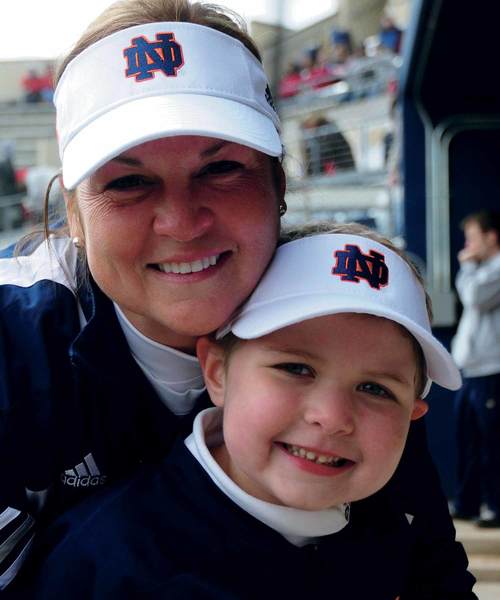
Deanna Gumpf
When life throws you a curveball
Deanna Gumpf’s 4-year-old daughter Tatum often left her mother in the dust as she rode her bike round and round the Notre Dame track while the veteran Irish softball coach jogged as part of her regular workout routine.
But in the summer of 2010, just as she was about to enter her 10th season as head of the University of Notre Dame softball program, Gumpf sensed something was amiss with her youngest child. Instead of repeatedly whizzing by her mother on her pink bicycle, wavy hair flying in the wind, Tatum struggled to complete a single lap.
“I’d say, ‘Come on, Tatum—what’s wrong with you?’ She loved riding her bike and would go for miles and miles. But now she was lethargic and tired, and that was so not her.”
For about three weeks, Tatum had wanted to do nothing more than lie quietly in her mom’s lap—she displayed no interest in swimming in the family’s backyard pool … or teasing her older brother Brady … or running around outside with her friends.
“I kept thinking, ‘This is so weird,’” Gumpf says. “I knew something was wrong, but not this wrong.”
When Tatum contracted an ear infection, Gumpf and her husband, John, the head baseball coach and assistant athletic director at Saint Joseph’s High School, were relieved, thinking once their normally energetic youngster started taking an antibiotic, she’d return to her usual perky self. But that didn’t happen. In fact, Tatum regressed. Her fever spiked every night, and she would sweat profusely. Uncharacteristically, she would sleep during the day. A return visit to the doctor resulted in a switch of medication, but Tatum still wasn’t bouncing back.
Two days after the second visit to the doctor, Tatum awoke with a dark, crusty substance covering her lips.
“I asked her, ‘What’s on your lips?’ I thought it was chocolate. But then I realized it was blood. When I brushed her teeth and washed her mouth, her gums started bleeding.
I called the doctor, and the office told me to bring her in right away. But I still didn’t get it. I still didn’t think it was really bad. I thought maybe strep throat. They did a blood test, and we went back to my office to wait for the results.”
Perhaps it was fitting that when Gumpf took the phone call that would turn her life topsy-turvy, she was in her office—a cozy, comfortable space on the second floor of the Joyce Center—a spot where she always felt confident, composed and safe—a place she could retreat to away from the hectic and chaotic routine of her busy life of dealing with the ups and downs of coaching 18- to 22-year-old women and making all the pieces fit in the jigsaw puzzle as a working wife
and mother. That office often provided much-needed peace and quiet and would quickly become her private sanctuary in the coming months.
An hour after leaving the doctor, Gumpf’s phone rang. She remembers every detail of that July 20 moment—the pain, the shock, the fear, the panic—as if it were yesterday.
“The doctor said, ‘Go sit down somewhere. There is something wrong with Tatum.
It could be two things, and they are both bad. Go to Memorial Hospital now.’”
Another blood test confirmed that Tatum most likely had either leukemia or aplastic anemia—often treatable, but both serious life-threatening diseases.
Deanna and John returned to their home on South Bend’s east side just long enough to pack a bag and make arrangements for care for their then 9-year-old son, Brady, before embarking on a long, agonizing and aggravating trip down U.S. 31 to Riley Hospital for Children in Indianapolis. Within four hours of receiving the devastating news, Deanna, John and Tatum were at Riley, beginning their unexpected medical journey with an uncertain outcome.
“I don’t remember the drive there at all,” Gumpf says. “I just kept thinking this was a death sentence.”
But as Deanna and John, who carried a sleepy Tatum in his arms, passed through Riley’s doors, they quickly felt a new sense of hope and optimism from the staff that greeted them.
Tatum immediately received a blood transfusion, and within 24 hours she was diagnosed with the most common form of cancer in children—acute lymphoblastic leukemia, a type of cancer in which the bone marrow makes too many immature lymphocytes (a kind of white blood cell). Within three days, Tatum began chemotherapy, to which she responded positively.
“The doctors and nurses were phenomenal,” says Deanna. “They educated us about her disease and what we were facing.
You become an expert, learning how to understand medical terms, blood counts, everything. And you quickly realize you are not the worst case scenario … just around the corner, in the room next door, are families in more dire straits.”
The Gumpfs’ training and experience as coaches began to kick in almost as soon as Tatum’s chemo port was inserted into her weakened body. Both knew how to deal with a difficult challenge: learn every minute detail about the opposition, devise an effective and appropriate game plan for throwing the opponent off its track and prepare mentally and physically for potential setbacks.
“Because of my coaching experience, I was able to deal with leukemia,” Gumpf says. “That first month you are just so emotional, but I needed to know procedures. I needed to know protocol, I needed to know the plan. I had to have a game plan, and I had to be very schematic about it.”
But, leukemia was an unfamiliar and particularly pesky foe. And Gumpf, a 1992 graduate of the University of Nebraska, also understood that even though Tatum was the patient, her entire family would bear the impact of the cancer diagnosis.
“They say that 70 percent of parents of children with cancer get divorced,” Gumpf says. “I get it—the stress and the anxiety can be unbearable. But John and I discovered that our core values matched really well and that helped. If you are both on the same page and you go about it in the same way, you can work it out.”
And they both worried about how their oldest child, Brady, would cope. Even though Tatum’s illness demanded, even required, so much of her parents’ focus, Deanna and John wouldn’t allow their busy and active fourth-grader to fall through the cracks.
“It’s been a roller coaster for Brady,” Gumpf says. “When Tatum lost her hair and just laid on the couch, he was very understanding. But there are times when she is so good—most people wouldn’t know she is sick. It is hard on him because everybody still treats her like a sick child. Friends and family look at him differently—and they don’t mean to—but I see it all the time. It’s like bringing a new baby into the house. We try to talk about it so he understands.”
Deanna’s assistant coaches—Kris Ganeff and Lizzy Lemire, both former Irish monogram winners—literally stepped up to the plate and paved the way for Gumpf to return to her coaching duties when classes began a month after Tatum’s diagnosis.
“Kris and Lizzy did such a fabulous job,” Gumpf says, who missed just five days of work during Tatum’s treatment. “They made it easy for me not to be there—which made it easier for me to be there. I told the team that if Tatum needed me or was having a procedure, I was going to be with her. But if she’s good, I’m good and I will be here.”
Together, her coaching responsibilities and her office became a safe harbor for Gumpf as Tatum progressed through her treatments. Softball provided a distraction from the constant fear every parent harbors 24/7 when his or her child faces a life-threatening illness. Her office was the one place Gumpf could face the unthinkable and privately just “lose it,” as she did when she learned that Bailey Moore, Tatum’s 14-year-old Riley roommate who had taught the four-year-old how to take her chemo pills, had lost her own battle to the same disease.
“I never not think about it,” admits Deanna. “But softball helped me and everybody keep a routine. I had to think about something else.”
In 2011, the Irish cruised to a 9-0 start—the best in program history, captured their second consecutive BIG EAST Conference regular-season title, returned to the NCAA Championships for their 13th straight appearance and won 46 games. Eight players earned all-BIG EAST honors, Deanna and her staff received the league’s Coaching Staff of the Year award and senior third baseman Heather Johnson became Notre Dame’s seventh conference player of the year. But what 2011 accomplishment means the most to Deanna, her staff and her players?
On April 17, in a game against BIG EAST opponent Louisville, the Irish raised more than $12,000 for Memorial Hospital’s pediatric oncology unit to lead all college teams’ efforts as part of the NFCA (National Fastpitch Coaches Association) Strikeout Cancer Initiative. What made the day even more meaningful was that Tatum, now 5 years old and sporting short curly hair, threw out the first pitch, as she finally was healthy enough to return to her mom’s workplace and cheer for her “big sisters.”
“Leukemia has made me a better coach,” Gumpf says upon reflection. “I’m a very intense person—and everything has a sense of urgency. That will always be me. But I now look at things that go wrong much more positively. Handling losses is so much easier. We look at the fundamentals and how to get better—we always did that—but now I can look at doing that with a lot less heat-of-the-moment emotion.”
Tatum, now in kindergarten at St.Joseph’s Grade School in South Bend, still undergoes a daily maintenance regime of oral chemotherapy and receives a chemotherapy treatment through her port once a month. Her treatment plan calls for one more year of chemotherapy (two-and-a-half years total) with routine checkups. The longer she remains in remission, the less chance there is of a recurrence.
“We are so grateful for the constant support we’ve received from our Notre Dame family and friends,” says Deanna.
“I’m a much happier person, and my family is living life better since Tatum’s diagnosis. You just enjoy what you have a lot more.”

